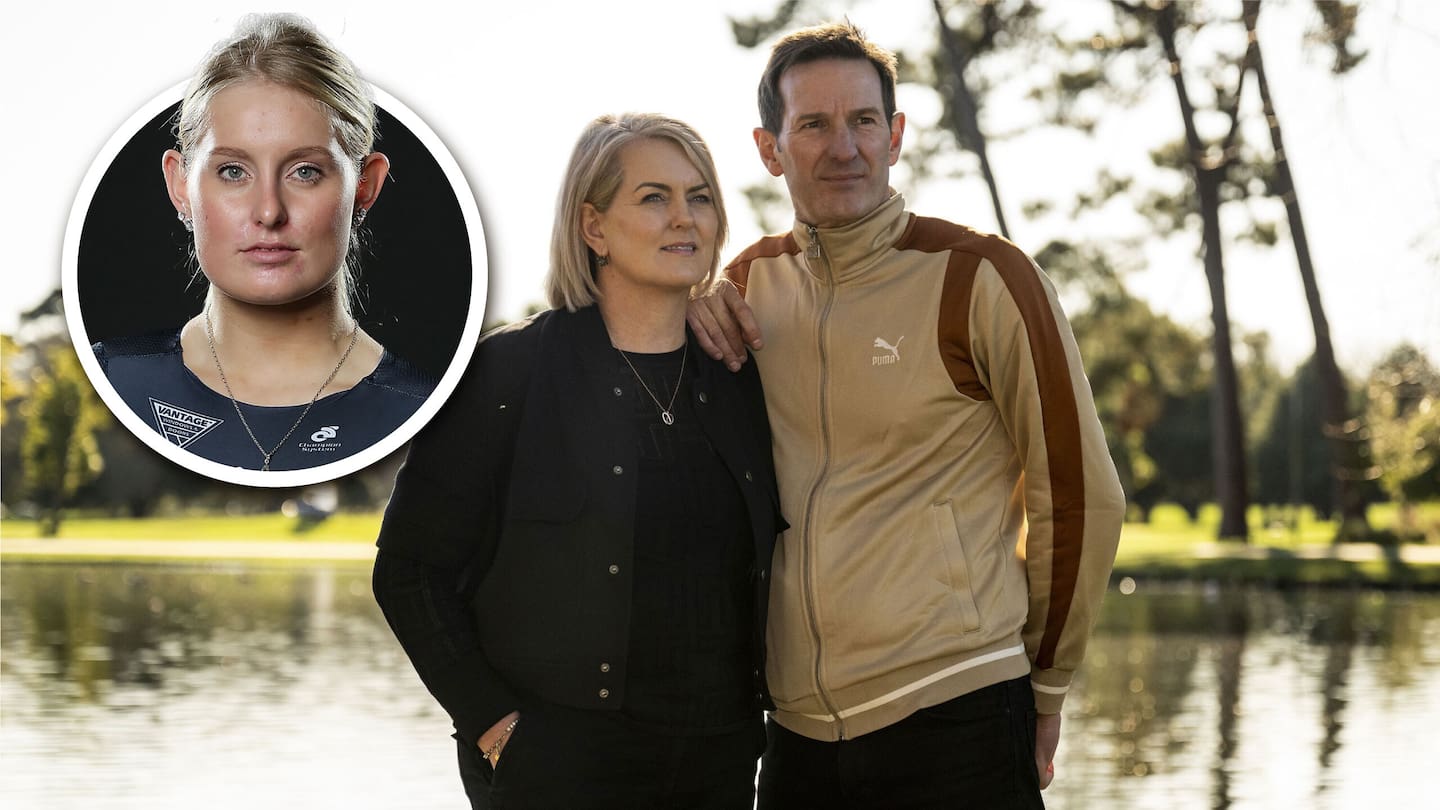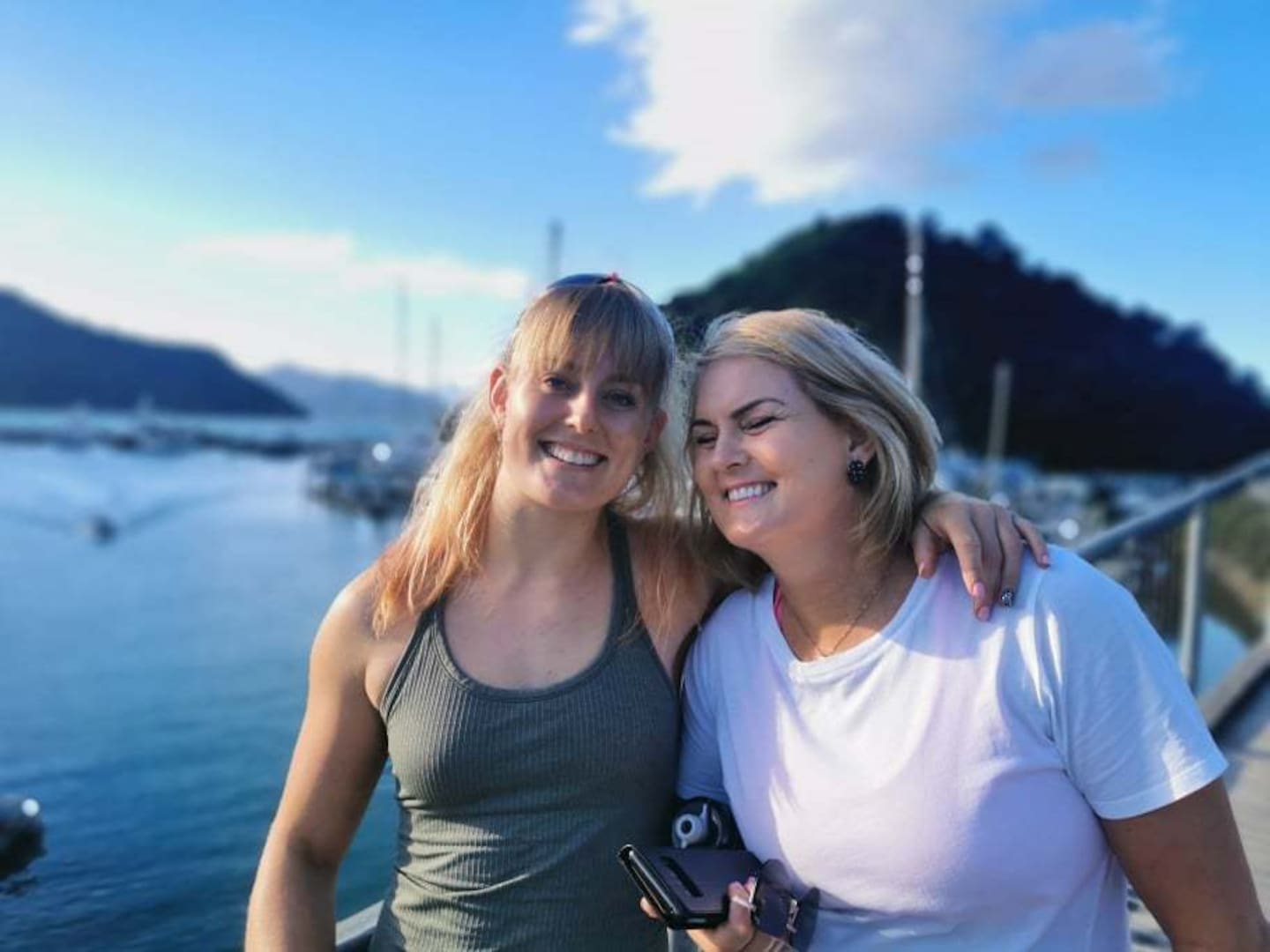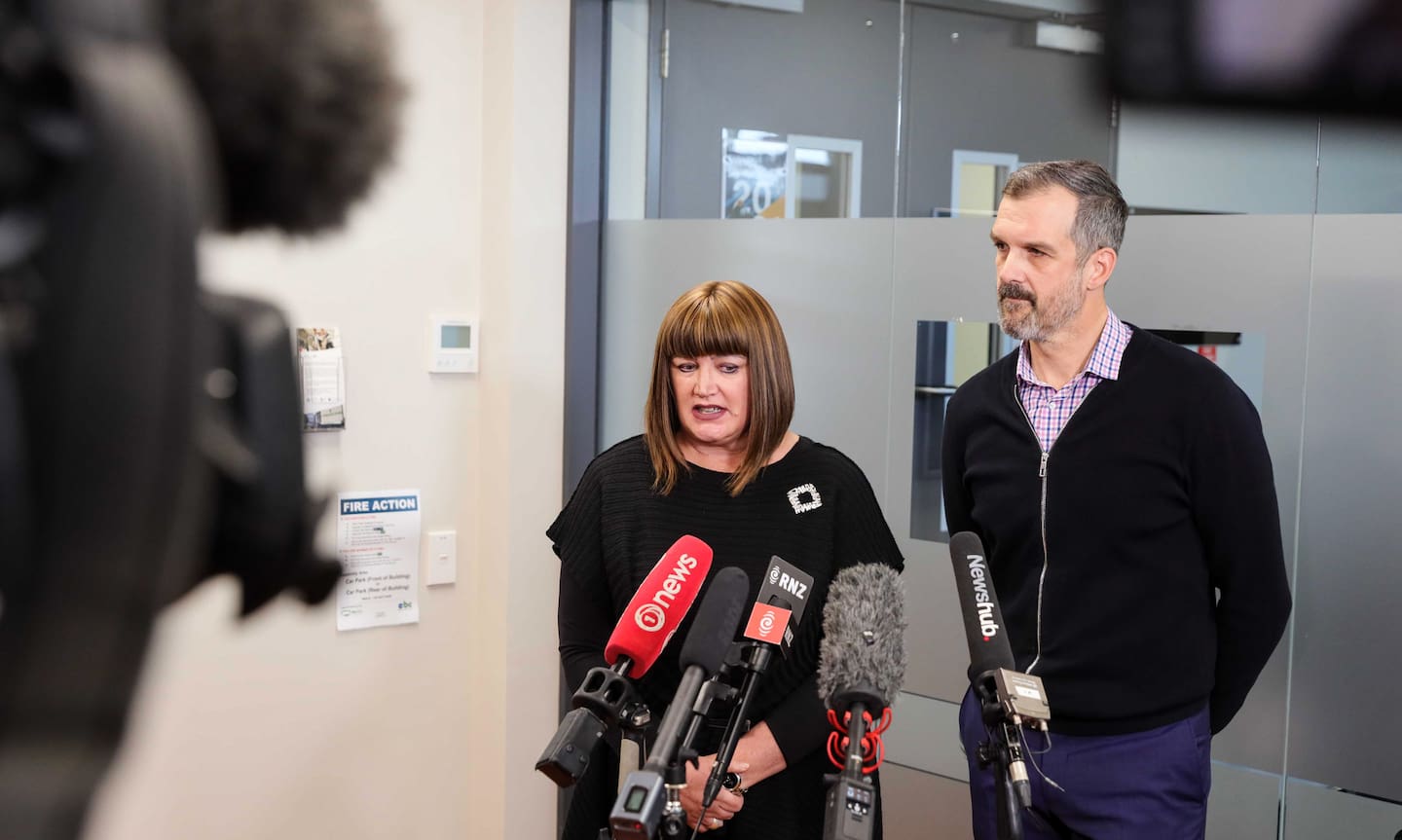- A coronial inquest has begun at the Hamilton District Court into the death of Olympic cyclist Olivia Podmore in a suspected suicide on August 9, 2021, one day after the Tokyo Olympics ended.
- The Herald revealed a litany of misconduct at Cycling NZ relating to Podmore, including pressure on her to lie during a 2018 investigation into impropriety at the sporting body.
- A damning 2022 report by KC Mike Heron found a number of cultural and structural deficiencies at Cycling NZ.
Olivia Podmore’s father said he was never once informed of the extensive mental health struggles the Olympic cyclist was going through in the seven years she lived at the Cambridge High Performance Sport NZ (HPSNZ) base before she took her life.
It was the first public statement from Phil Podmore since the death of the 24-year-old Rio Olympian on August 9, 2021, and was issued as part of the opening statements into the coronial inquiry into her death at Hamilton District Court this morning.
The joint statement from Phil Podmore, and Olivia’s brother Mitchell, was read out by Christchurch barrister Hamish Evans and asked the question how such a “senseless tragedy” could happen to “a young star of New Zealand Cycling”.
“In the whole time Olivia was under Cycling NZ (CNZ) care, neither Phil or Mitchell were made aware of the challenges she was going through,” Phil and Mitchell Podmore said.
The statement also delved into a central controversy that defined Olivia Podmore’s time at CNZ - after she unintentionally exposed a relationship between an athlete and coach at a 2016 training camp in Bordeaux.
The statement revealed an extra detail about that incident, claiming that Podmore was “outed as the whistleblower” after having what she believed was a confidential conversation with a CNZ coach following the discovery of the relationship.
“The real low point [of her time in the CNZ system] was when she found out one of her teammates was having a relationship with a coach.”

Olivia Podmore 's mum Nienke Middleton speaking at the coroner's inquest at the Hamilton High Court. Photo / RNZ pool
Phil and Mitchell Podmore’s statement claimed that when she returned to New Zealand following a disappointing Rio Olympics performance she was “blamed for the loss of the coach” after Anthony Pedin resigned from CNZ.
“CNZ placed her in a position where she was bullied … it must have been a truly awful position to be put in,” the Podmores said.
Her eventual non-selection from the Tokyo Olympics in August 2020 was “all the more devastating because Olivia did not understand why she was not selected,” the Podmores said.
“For someone as focused and driven as Olivia … it must have been a crushing experience and ultimately it proved to be so …. every person has a breaking point … a sense where one feels there is no second chance.”
The alleged lack of communication to Phil Podmore was striking, given the other statements this morning from Paul David KC on behalf of CNZ and Olivia Lund on behalf of HPSNZ.
Lund said in the HPSNZ system there was “extensive mental health care and support provided to Olivia, [that] included referrals to external counsellors and external clinical psychologists when necessary”.
“Olivia had a complex medical history with both physical and mental factors impacting on her sporting performance and general health over a long period of time.
“There were multiple stressors that contributed to Olivia’s mental health challenges, some of which arose from within the cycling high performance environment and others which were personal to Olivia,” Lund said.
Podmore died the day after the Tokyo Olympics ended after the track cyclist failed to qualify for that event following a tortuous Covid-19-interrupted selection process.

Coroner Luella Dunn on day one of the Olivia Podmore inquest at the Hamilton High Court. Photo / RNZ pool
The then 24-year-old had competed in the 2016 Rio Games but was drawn into numerous controversies behind the scenes of Cycling NZ in the years that followed.
The ramifications of Podmore’s death led to a 2022 independent review, by
Mike Heron KC and Professor Sarah Leberman, that handed down damning findings about a CNZ culture that “prioritises medals over wellbeing”.
But the terms of reference for that immediate review were to strictly focus only on the broad cultural issues of that national sporting body - despite them being instigated by Podmore’s death.
It’s only now that answers that specifically relate to Podmore’s treatment by coaches, administrators, and medical professionals at CNZ can be asked in court.
‘There is no dispute’ Olivia died by suicide
At the outset of the coronial inquest set to go for three weeks, Coroner Louella Dunn said “there is no dispute” Olivia died by suicide.
“The focus of this inquest will be the mental health challenges Olivia faced and the care she received.”
Dunn said the issues the inquest was attempting to answer were:
- What were the circumstances of Olivia’s death?
- What did HPSNZ and CNZ know of Olivia’s challenges before her death and did they have sufficient knowledge to help her?
- What steps did they take and were they appropriate to address the health challenges?
- If another athlete had the same mental health issues today as Olivia experienced - would the response from HPSNZ and CNZ be different?
Olivia’s friend and former HPSNZ campaign manager, Jessica Massey, who worked for CNZ from 2011 to 2021 was the first witness.
Massey detailed her own experience within CNZ and the negative impact that organisation had on their mental health.
“I was her direct support person and trusted friend within CNZ. I was also Olivia’s sounding board where we could discuss the issues within CNZ in a manner that was both relatable and supportive to each other,” Massey said.
“I also struggled with my mental health, largely resulting from my stressful employment with CNZ. This brought us closer together and created transparency between us about the state of our mental health and how we were each managing it.”
Massey describes Olivia coming to live at Cambridge away from her family as a “relatively vulnerable 17-year-old with a lack of robust support systems around her”.
“She had left school early and had no substantive study or career aspirations beyond cycling that I knew of.”
Massey said early on Podmore had experienced unfairness and poor communication within the CNZ system.
“Prior to the 2016 Olympic Games, Olivia had already been exposed to the unfair selection process within CNZ.
“Based on my experience and observation, many cyclists, both male and female, were victim to poor or unjustified selection decisions and the subsequent inadequate communication of these decisions. I understand this still to be an issue today,” Massey said.
Another systemic issue was that there was “no way Olivia could access medical and health support without CNZ or HPSNZ knowing about it”.
“If Olivia required a health appointment of any kind, receipts for these appointments were submitted and processed for reimbursement through ‘carded athlete’ funds which had to be signed off in alignment with HPSNZ’s carding processes,” Massey said.
Coaches or related HPSNZ staff members had to approve these appointments as a valid expense.
“Olivia could not otherwise afford medical appointments. I know that Olivia did not feel like she could reach out to her family for support as she did not want her parents to know the extent of her mental health issues. Olivia was trying to paint a rosy picture of her life in Cambridge,” Massey said.
“Naturally, Olivia wanted to do all that she could to make it to the Olympic Games. She was also fully reliant on the programme for all psychological, educational, and particularly financial support.
“This meant Olivia did not want to push back on aspects of CNZ’s culture or processes that were clearly wrong, to avoid compromising her Olympic prospects or access to her wider support network.”
Massey was also damning on the lack of confidentiality within CNZ.
“I know Olivia tried to talk to people confidentially but her disclosures would always come back through the CNZ / HPSNZ network. She could not safely express the impact that CNZ’s toxic culture was having on her for fear of CNZ staff, being the perpetrators of this culture, finding out and not being held to account.”

Cyclist Oliva Podmore (inset), her mother Nienke Middleton (left), and Nienke's husband Chris Middleton (right) in Hagley Park. Photo / Joe Allison
Three year wait for answers
In formal terms, coroners conduct inquests to determine the cause and circumstances of death and identify ways to prevent similar deaths in the future.
About 30 witnesses will appear at the inquest, including Olivia’s mother Nienke Middleton and her husband Chris, who will be representing themselves without legal counsel.
“I’ve got to be the lawyer, by default,” Chris Middleton said. “It was probably going to be another $150,000, so we made the fairly simple choice that we’ll do it ourselves.”
The Middletons have already undertaken an extended legal battle to obtain Podmore’s medical records from HPSNZ, costing them tens of thousands of dollars.
More than 1000 medical documents were suppressed ahead of the coronial inquiry, the Middletons say.
Chris said the documents, which they finally obtained in late 2022, made for disturbing reading.
“There’s been an awful lot of noise coming out of [HPSNZ]. They’ve just fought absolutely everything pre-inquest, everything suppressed ... God, it’s just been relentless,” he said.
“There’ll be a lot of nervous people there I would think.”
Nienke added: “We’ve basically had to kick and scream for everything”.

Olivia Podmore (left) with her mother Nienke Middleton (right). Photo / Supplied
There are a number of non-publication orders for the names of health professionals who worked within the HPSNZ system, as well as a CNZ staff member.
HPSNZ, CNZ and several other witnesses sought non-publication orders through Kings Counsel. All up, there will be four KCs at the inquest - something that riles Chris , given the legal expenses the family has personally endured over several years.
Other notable witnesses at the inquest include friend and two-time Olympic gold medalist Eric Murray, and Podmore’s housemate at the time and close friend Andrew McLean. This was the residence where Olivia died on the outskirts of Cambridge.
Both Murray and McLean were with Podmore the weekend before she died, skiing in Queenstown.
Among the coaches speaking at the coronial inquiry will be former CNZ lead track sprint coach Rene Wolff and CNZ high performance director Martin Barras, as well as the chief executive at the time Jacques Landry.
All three men resigned from their roles in the six months following Podmore’s death.
Sport NZ chief executive Raelene Castle will also appear as a witness.
“We would like to extend our sympathies to the family and friends of Olivia Podmore. HPSNZ appreciates that the coronial inquest will be a very difficult time for them,” Castle said in a statement.
“It may also be a difficult time for those who worked closely with Olivia within the high performance system and HPSNZ will be providing support if and when needed.
“Athlete wellbeing is one of the three key focuses of the HPSNZ strategy, and a lot of new initiatives, updated policies and compulsory training have been introduced across the high performance system over the last four years.
“We are all continuously learning, and the coronial inquiry will be an important next step in the process, as we work to ensure that high performance sport is a place where all athletes can thrive and succeed.”

Raelene Castle, head of high Performance Sport NZ (left), and Jacques Landry, former chief executive of Cycling New Zealand at a press conference at the Cambridge Velodrome regarding the death of Olivia Podmore in 2021. Photo / Mike Scott
In 2021, the Herald revealed that Podmore had been caught up in a number of controversies throughout her time with CNZ.
In her final social media post, hours before she died, Podmore referenced a “cover-up” at CNZ.
In 2016, Podmore unwittingly exposed the intimate relationship between a CNZ teammate and a coach after she reported the athlete had not returned home to their hotel after a night out during a training camp in Bordeaux, six weeks out from the Rio Olympics.
The fallout from this athlete-coach relationship led to another 2018 independent review, also by Heron.
In the week after her death, the Herald revealed that Podmore was an athlete cited in the 2018 Heron review who had been pressured to lie by CNZ.

Cycling NZ sprint team partners Natasha Hansen (left) and Olivia Podmore (right). Photo / Photosport
At the end of 2018, Podmore was paid a $20,000-plus sporting grant for welfare reasons that several involved with CNZ and close to her described as questionable.
The Herald has also reported on the personal challenges Podmore faced in the last year of her life, after she was told in August 2020 she would not be selected for the Tokyo Olympics. Podmore was using drugs recreationally during this time, and receiving psychological help.
Many fellow CNZ athletes felt Podmore was unfairly treated during selection for those Olympics. A legal dispute around selection lodged by another CNZ athlete close to Podmore complicated matters further.
Many CNZ athletes the Herald spoke to in 2021 were highly critical of the methods and culture created by Barras, who oversaw the decision to not select Podmore for the Tokyo Games.
Tom Dillane is an Auckland-based journalist covering local government and crime as well as sports investigations. He joined the Herald in 2018 and is deputy head of news.
SUICIDE AND DEPRESSION
Where to get help:
• Lifeline: Call 0800 543 354 or text 4357 (HELP) (available 24/7)
• Suicide Crisis Helpline: Call 0508 828 865 (0508 TAUTOKO) (available 24/7)
• Youth services: (06) 3555 906
• Youthline: Call 0800 376 633 or text 234
• What's Up: Call 0800 942 8787 (11am to 11pm) or webchat (11am to 10.30pm)
• Depression helpline: Call 0800 111 757 or text 4202 (available 24/7)
• Helpline: Need to talk? Call or text 1737
If it is an emergency and you feel like you or someone else is at risk, call 111
Take your Radio, Podcasts and Music with you









